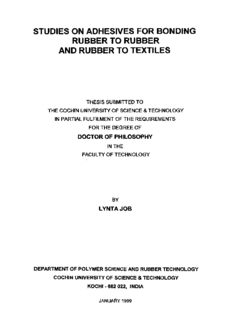
Studies on adhesives for bonding rubber to rubber and rubber to textiles PDF
Preview Studies on adhesives for bonding rubber to rubber and rubber to textiles
STUDIES ON ADHESIVES FOR BONDING RUBBER TO RUBBER AND RUBBER TO"TEXTILES THESIS SUBMITTED TO THE COCHIN UNIVERSITY OF SCIENCE &TECHNOLOGY IN PARTIAL FULFILMENT OF THE REQUIREMENTS FOR THE DEGREE OF DOCTOR OF PHILOSOPHY IN THE FACULTV OF TECHNOLOGY BY LYNTAJOB DEPARTMENTOF POLYMER SCIENCE AND RUBBER TECHNOLOGY COCHIN UNIVERSITY OF SCIENCE & TECHNOLOGY KOCHI • 682 022, INDIA JANUARY 1999 "Thusfar the Lordhas helped us" DECLARATION I hereby declare that the work presented in this thesis is based on the original work done by me under the guidance ofDr.Rani Joseph, Professor, Department of Polymer Science and Rubber Technology, Cochin University of Science and Technology, and that no part of this thesis has been included in any other thesis submittedpreviously for the award ofany degree. M- Lynta Job Kochi-22, 27January 1999. DEPART,"ENT OF POLYMER SCIENCE AND RUBBER TECHNOLOGY COCHINUNIVERSITYOFSCIENCEAND TECHNOLOGY KOCHI-681 022, INDIA Dr.Rani .Ioseph Professor 27 January 1999 Certificate ~ i& to~IIud~ ~~ "Studiesonadhesives/or bonding rubberto rubberand rubberto textiles" i& ~on ~ ~ ~ d<YlW by Ms.LyntaJob~m;t~and~in~ pj)~o/pj'Joty 8cWnoo and ~ dT~andIIudnojuMet~kM kMt me1l ~in~~~~F~~o/~~~' ~~ Rani Joseph (Supervising Teacher) e-mail: hodpsrto'mJ2.\"Ill net.m ACKNOWLEDGEMENT I wish to express my deepest sense of obligation and gratitude to Dr.Rani Joseph, Professor. Department ofPolymer Science and Rubber Technology, Cochin University of Science and Technology for her invaluable guidance and perpetual inspirationthroughoutthese investigations. I am extremely thankful to Prof(Dr.)A.P.Kuriakose, Head ofthe Department ofPolymer Science and Rubber Technology, for providing all the necessary help for the successful completion ofthis work. I am also grateful to Prof(Dr.)K.E.George of the Department of Polymer Science and Rubber Technology for providing me necessarysuggestions and constantencouragement. Prof.(Dr.)DJosephFrancis, former Headofthe Department whose affectionate enquiries and cooperation were a blessing indeed. I am also grateful to all the faculty members ofthis department for theirco-operation and encouragement. I extend my heartfelt thanks to Prof(Dr.)P.Madhavan Pillai and Prof.(Dr.}K.L.Sebastian former heads of the Department of Applied Chemistry and Dr.K.K.Mohammed Yusuff, head of the Department of Applied Chemistry for the inspirationand helpextendedto me. With a deep sense of gratitude, I express my sincere thanks to all my fellow research scholars ofthe Department. I would also like to thank Dr. G.Ajithkumar and Mr. Nibu George, International School of Photonics, for theirwhole heartedco-operationand help. I am very much indebted to the non-teaching staffofthe Department for all the help and co-operation. Special thanks are due to the Staff of the University Science Instrumentation Centre for their timely help and advice in fabricating various partsofexperimental systems. Thanks are due to Apollo Tyres, Perumbra and Premier tyres, Kalamassery for providingnecessary facilities related to my research work. I am grateful to Council of Scientificand Industrial Research (CSIR), Govt. of India,for the financial assistance. I hereby acknowledge with thanks the invaluable services rendered by the staff of'SagaMedia' for the preparationofthis thesis. Finally, I am very much indebted to my husband Dr.Jayan Thomas, our daughter Merin Philo Thomas, our parents, brothers and sisters and all our relatives and friends for theiraffection, patience, interestandconstantencouragement. LyntaJob Contents Page Cbapter I Introduction CbapterD Experimental Techniques 40 Cbapterm PartI 56 Studieson adhesives basedon natural rubber and waste latex reclaim for bonding vulcanizatesof NR with NR and NR/PB with NR/PB Part11 69 Developmentoflow cost adhesives for precuredretreading process CbapterIV Part I 78 Studiesonadhesives basedon differentelastomers for bonding vulcanizates ofCR with CR. CR with NR and NR with NBR Part11 90 Developmentofroom temperature curable adhesives for bonding vulcanizates ofCR with CR and NR with NR Cbapter V Part I 101 Studies on rubberto nylon tire cord bonding Part 11 123 Studies on rubberto rayon tire cord bonding ChapterVI Part I 142 Studieson theeffectofreplacementofRF resin in the RFL adhesive partially or wholly by otherpotential agents Partll 169 Comparison andevaluation ofthe efficiency ofnovel adhesives developed withthatofcommercial adhesives ChapterVll Summary andconclusions 176 List ofAbbreviations NR Natural rubber PB Polybutadiene rubber NBR Acrylonitrile-butadiene rubber CR Chloroprene rubber CNR Chlorinatednatural rubber NRlatex Natural rubber latex VPlatex Vinyl pyridine terpolymer latex ZnO Zinc oxide VulkanoxHS 1,2,-dihydro-2,2,4-trimethyl quinoline, Polymerized Vulkanox4020 N (1,3- dimethyl butyl N'- phenyl - p-phenylene diamine) RAF, N- 330 Highabrasion furnace black VGC Viscosity gravity constant MgO Magnesium oxide MOR Benzthiazyl-Z-sulphenmorpholide TMTD Tetramethyl thiuram disulphide TMTM Tetramethyl thiuram monosulphide NA22 Ethylenethiourea PF Phenol formaldehyde CNSL Cashewnut shell liquid ZDC Zinc diethyl dithiocarbamate MBTS Dibenzthiazyl disulphide T Scorchtime-The time taken for attaining 10% ofthe lOmin maximumtorque. T90min Optimumcuretime -Thetime taken forattaining90% of the maximum torque l\M Mass loss p Densityofsample. kg-f Kilogramforce N/mm Newtonpermillimeter N/mm2 Newton permillimeter square psi Poundsper squareinch Chapter I INTRODUCTION When two solids with plane surfaces are brought together they make contact on the molecular scale only at rare points at their common interface. The application offorce across the interface can cause distortion ofthe contact points making them into areas but some ofthe energy applied in doing this is stored as elastic energy and on removal ofthe load, it is utilized inbreaking any union formed. The introduction of a liquid to displace the air can create a situation in which real contact is made throughoutthe interfacebut notbetween bodyand body,but betweenbodyand liquid. Ifthis liquidcan solidify, the desired state ofsolid body contact is achieved although the solid body contains a plane ofchemically different substances. This material used to bring about the change from occasional touch to intimate contact is an adhesive. Adhesion refers to the state in which two dissimilar bodies are held together by intimate interfacial contact such that mechanical force or work can be transferred across the interface. The interfacial forces holding the two phases together may arise fromvander Waalsforce,chemical bondingorelectrostaticattraction. Themechanical strength ofthe system is determined not only by interfacial forces, but also by the mechanical properties of the interfacial zone and two bulk phases. Various other definitions for adhesion have been proposed However, none is completely 1-7. satisfactory or generally accepted. Any satisfactory definition must account for both the thermodynamic and mechanical aspects ofadhesion.
Description: